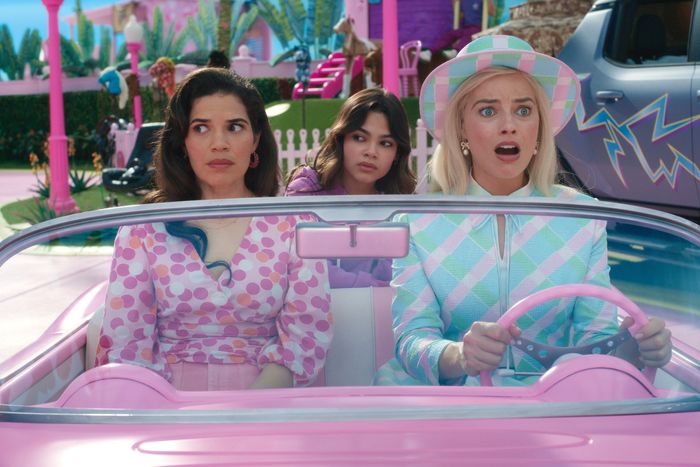
This article originally appeared in Gold Rush, a subscriber-only newsletter about the perpetual Hollywood awards race.
The week after Oscar nominations is a strange time for every awards pundit. Phase One of awards season — the era from Labor Day to late January, where contenders introduce themselves to voters at film festivals, schmoozy cocktail parties, and industry talkbacks — is over. The little movies that we’ve nurtured for months are finally out in the world. The conversation that used to take place among a small-but-intense group of weirdos now expands to include the general public. A week ago, you didn’t know Hillary Clinton’s opinions on the Best Director race. Now you do!
The nominations announcement means that my Oscar Futures column has wrapped up for the season. But fear not — we’ve entered Phase Two, where the stakes get bigger, the skulls get duggery-er, and the parties … well, the parties get worse. (Academy bylaws forbid campaigns from serving food or alcohol after the nominations.) This year, I’m heading straight into Gold Rush, a new newsletter devoted to all things awards season, where I will continue to hold forth on Oscars rivalries, snubs, and narratives at a time when even people who did not serve as secretary of state are invested in the horse race. Now that we actually know who’s competing, we can really lock in and ask the important questions. Questions like, Can a snub in one category actually help you in another? Who’s the Best Actor front-runner? Can anyone beat Oppenheimer? And how mad should you be about Barbie’s Oscar shutout?
Was Barbie Snubbed?
Here’s my take on the Barbie fracas: People are upset, and when people are upset, they make bad arguments.
I would never deny anyone their God-given right to complain about the Oscar nominations, but if you want to do it without embarrassing yourself, I’ve got some tips. The first is to familiarize yourself with how the Academy Awards work. Every member of the Academy belongs to a branch, and for the nominations, each branch only votes for its own categories: Actors vote for the four acting races; directors vote for Best Director. So while it is darkly comic that a film about the challenges of modern womanhood would see its male comic relief nominated while its female auteur was left out of the directing lineup, remember that those decisions were made by two completely different groups of people.
As for the implication that Margot Robbie was snubbed in Best Actress because she’s a woman (the “Charlie Brown had hoes” of awards-season takes), recall that, in all likelihood, Barbie’s seat was taken by a 64-year-old lesbian trying to swim from Florida to Cuba. Plus, however much internalized misogyny prevented Barbie from reaching its full awards-season potential — and I agree there was probably some, though the directors branch might say they were operating out of principled anti-capitalism — it wasn’t enough to stop America Ferrera from being nominated in Supporting Actress.
The second rule: If you’re going to complain about a snub, you should consider who your preferred nominee would push out. In the case of Robbie, I suspect most people would trade Carey Mulligan or Annette Bening, whose Netflix biopics have attracted more than their fair share of internet eye-rolls. But who are you bumping from this year’s murderer’s row of Director nominees, which includes two Hollywood filmmakers at the peak of their powers and three Europeans with distinct and original points of view? Personally, I’d probably swap Gerwig in for Yorgos Lanthimos — whose film Poor Things I found half as funny as Barbie, and twice as self-satisfied — but I am aware that’s not a consensus opinion.
Finally, try to be internally consistent. You can argue, as Judd Apatow has, that slotting Gerwig and Noah Baumbach’s screenplay in Adapted rather than Original is a slight, if you’d like. Just know that you are now arguing Spike Lee’s screenplay Oscar for BlacKkKlansman is less prestigious than Green Book’s.
Is There a Path Forward for Barbie?
While it’s important to remember who’s voting, you can also learn something by remembering who’s not voting. One of the fastest-growing segments of the Academy is the members-at-large, a catchall group for agents, executives, stunt people, etc. Because these members don’t have a branch to call their own, they’re functionally invisible at the nominations, where the only category they vote for is Best Picture. When it’s time to decide the final Oscars winners, though, they get to vote in every category just like everybody else. The same is true for members of branches that don’t have a corresponding category, like casting directors and producers. If Oscars season is a presidential election, they’re the independents — can’t vote in the primary, can vote in the general — and they number in the thousands.
That’s why I think, despite those two big misses, there could still be a path forward for Barbie to take home a major trophy on Oscar night. (Right now, pundits only have it winning one of its eight nominations: Best Original Song.) Imagine the tastes of these voters. Is it absurd to think that they might be a little more welcoming to Greta Gerwig’s film than the po-faced auteurs who make up the directors branch? Or, since it is apparently 2016 all over again, is this just me doing the awards-season equivalent of fantasizing about superdelegates?
Can Anyone Unseat the Other Half of Barbenheimer?
This season feels like a throwback to the ’90s Oscars, when awards season was dominated by serious Academy-friendly dramas that were also massive mainstream hits: Dances With Wolves, Schindler’s List, The English Patient, Shakespeare in Love, and the granddaddy of them all, Titanic. In all likelihood, Oppenheimer will join them. Christopher Nolan’s film dominated precursor season, then led the field with 13 Oscar nominations, one shy of tying the all-time record. Everything looks set for Oppenheimer to win Best Picture, Best Director, and a whole lot else.
If it did, that would be a rare occurrence in today’s awards landscape. Over the past five years we’ve seen a foreign film, a streaming movie, and a gonzo comedy win Best Picture. The only kind of film that hasn’t won? The film that everyone expects to win. Once Upon a Time in Hollywood, The Irishman, Belfast, The Power of the Dog, The Fabelmans — on paper they were juggernauts; on the Oscar ballot they were not. So while the prospect of anyone upsetting Oppenheimer seems absurd at this point, recent history says we should not rule it out. But who, if anyone, is going to do it?
To pull off the upset, a film needs two things. First, it needs to have been nominated for a top prize at a major precursor, where a headline-making victory can create a sense of momentum. (Think of the way CODA’s surprise SAG Ensemble win catapulted it from also-ran to champion.) Second, since nobody ever wins just Best Picture — okay, it happened once, in the ’30s — a film needs to have also been nominated in a major above-the-line category at the Oscars. The road to Best Picture runs through Screenplay or Director. If you’re not winning one of those, you’re not winning, period.
What About the Other Best Picture Nominees?
With all of the above in mind, here’s my back-of-the-napkin rankings of which of the non-Oppie nominees has the best shot.
8. and 9. Maestro and Past Lives
Since every Best Picture nominee was also nominated at the Producers Guild Awards, none of them are entirely out of the race. But though these two tales of New York creatives’ messy love lives both earned Screenplay nods, neither was nominated at SAG or BAFTA. (Both were left out of Best Feature at the DGAs as well, though Past Lives’ Celine Song did score a best-debut nod.) They’re just along for the ride.
7. The Zone of Interest
Jonathan Glazer’s Auschwitz-set kitchen-sink drama likewise missed out on top noms from SAG, DGA, and BAFTA, but it has fallback options the pair above don’t. It’ll compete in Best British Film at BAFTA, and earned Screenplay and Director recognition at the Oscars. Zone also seems likely to win the Best International Film trophy, giving it a solid floor.
6. American Fiction
Now we’re in CODA territory. The lit-world satire hasn’t racked up the huge nomination totals of the competition, but it has two things going for it. One, in the places it did show up — SAG Ensemble and Oscar’s Adapted Screenplay — Fiction has a puncher’s chance at the win. And two, the film outperformed expectations on nomination morning, suggesting this likable comedy has some sleeper potential.
5. Anatomy of a Fall
Another film that did better than expected with the Academy, popping up in Actress, Director, and Editing to go along with the predicted Picture and Screenplay love. Let’s see if Anatomy can pull off the upset at BAFTA, our most international precursor, though given how much the Brits’ picks have diverged from the Academy’s recently, even that might not be enough for the Palme d’Or winner.
4. The Holdovers
Justine Triet getting into Best Director was probably also net-good for The Holdovers — can you imagine what last week would have been like if Alexander Payne had snagged the fifth spot instead? The downside for the boarding-school dramedy is that it’s unlikely to win the DGA or BAFTA. But Payne’s film boasts a decent shot of ending Oscar night with multiple trophies. Da’Vine Joy Randolph is almost certainly taking Supporting Actress, and in Original Screenplay it’s running neck-and-neck with Anatomy of a Fall. If Holdovers wins those, and Paul Giamatti becomes the Best Actor front-runner, that’ll be the strongest résumé of any challenger.
3. Poor Things
Yorgos Lanthimos’s steampunk sex romp received every nom it needed at the Oscars. So why is it third? Mostly because it was left out of SAG Ensemble. If Oppenheimer is going to lose anywhere, I suspect it’s there, and Poor Things missing means its chances of a narrative-shifting precursor win are slim.
2. Barbie
Conversely, I see the large, colorful Barbie ensemble as the cast with the best shot of upsetting Oppenheimer at SAG. Call me a simp, but don’t discount the possibility of a game-changing precursor win, combined with last week’s uproar, getting some wind back in the sails of the pastel-colored comedy.
1. Killers of the Flower Moon
Otherwise, we’re back where we were a month ago, with Scorsese’s western leading the pack of non-Oppenheimer contenders. Still, even its position is looking shakier than it used to. If we accept that Christopher Nolan is a mortal lock to win Best Director, then any underdog Best Picture victory would have to come through Screenplay — and that’s one place Killers didn’t show up.



